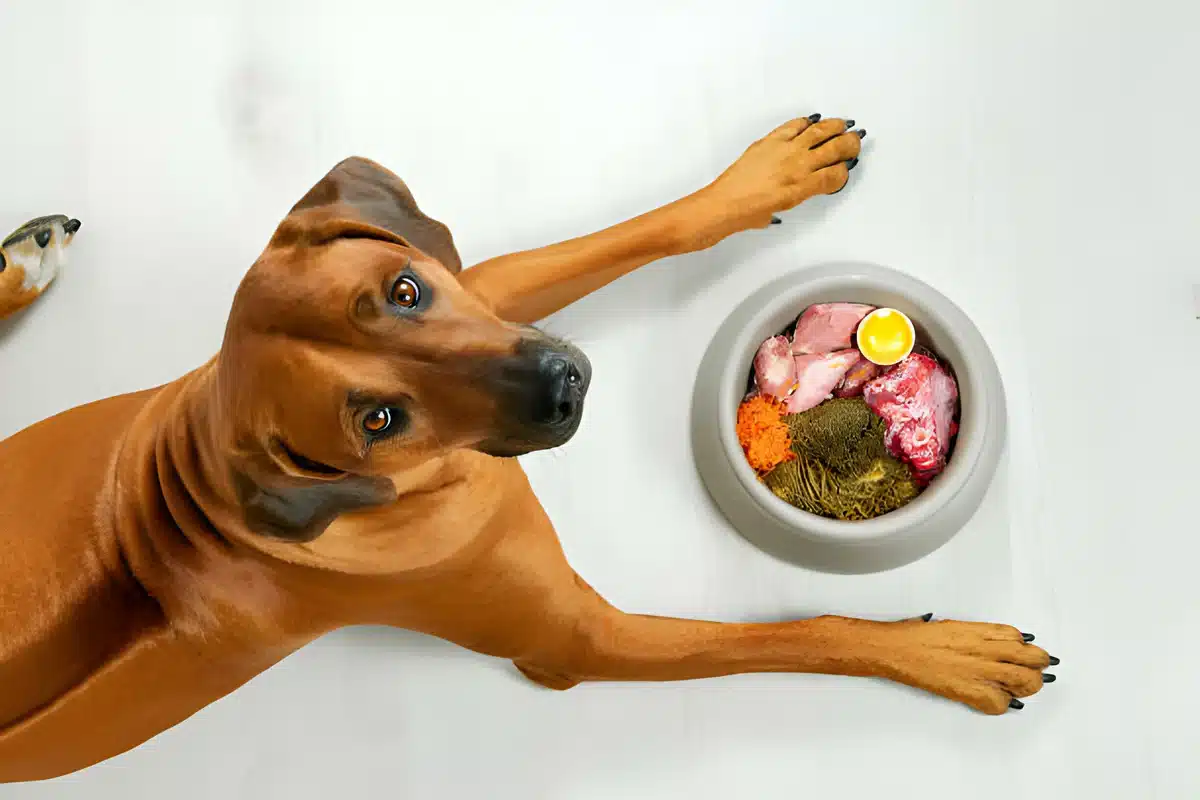A balanced dog diet is key to your dog’s health. It helps them live a long, happy life. Finding the right balance can seem challenging, but it’s straightforward once you know the basics. Let’s explore how to build a balanced dog diet to meet your dog’s nutritional needs.
Balanced Dog Diet
A balanced dog diet includes all the nutrients your dog needs. This diet must have the right mix of proteins, fats, carbohydrates, vitamins, and minerals. Each nutrient plays a specific role in your dog’s health and well-being.
Proteins
Proteins are vital for muscle growth and repair. They also support a strong immune system. High-quality protein sources include chicken, beef, fish, and lamb. Look for dog foods with named meats, not meat by-products.
Fats
Fats provide energy and support healthy skin and a shiny coat. They also help absorb certain vitamins. Good fat sources are fish oil, chicken fat, and flaxseed. Omega-3 and Omega-6 fatty acids are crucial for your dog’s coat health.
Carbohydrates
Carbohydrates offer energy and aid in digestion. They come from sources like brown rice, sweet potatoes, and peas. Carbohydrates help keep your dog’s digestive system working well. Avoid fillers like corn or wheat, which can cause allergies.
Vitamins and Minerals
Vitamins and minerals support various body functions. They boost the immune system and keep bones strong. Look for dog foods with vegetables and fruits like carrots, apples, and spinach. These ingredients help meet your dog’s vitamin and mineral needs.
Choosing the Best Dog Food
Selecting the right dog food is crucial for a balanced diet. Look for high-quality brands with natural ingredients and a balanced nutrient profile. You have several options for dog food.
Dry Kibble
Dry kibble is convenient and helps with dental health. It’s also easy to store and measure. Choose brands with high protein content and natural ingredients. Check the label for meat as the first ingredient.
Canned Food
Canned food has higher moisture content, which is good for hydration. It’s often more flavorful, so it works for picky eaters. Look for canned foods with high-quality meat and vegetables.
Raw Diet
A raw diet includes raw meat, bones, and vegetables. It offers control over ingredients but requires careful planning. You must balance nutrients to ensure your dog gets everything they need.
Homemade Meals
Homemade meals give you full control over your dog’s diet. They can be a good choice if you have the time to prepare balanced meals. You will need to research and ensure you meet all nutritional needs.
Essential Ingredients for a Balanced Dog Diet
To build a balanced dog diet, focus on these essential ingredients. They help create meals that meet your dog’s needs.
High-Quality Proteins
Choose high-quality proteins like chicken, beef, and fish. They provide essential amino acids for muscle health. Avoid dog foods with vague meat sources or by-products.
Healthy Fats
Include healthy fats like fish oil and chicken fat in your dog’s diet. They support energy levels and coat health. Look for products that list specific fat sources on the label.
Nutrient-Rich Carbohydrates
Carbohydrates from sources like brown rice and sweet potatoes offer energy. They also help with digestion and overall health. Avoid dog foods with low-quality fillers.
Fresh Vegetables and Fruits
Fresh vegetables and fruits are great for vitamins and minerals. Carrots, blueberries, and spinach are excellent choices. These ingredients provide important nutrients and antioxidants.
Homemade Dog Food Recipes
Preparing homemade dog food is an option for many pet owners. Here are some simple recipes to get you started.
Chicken and Rice Recipe
- Ingredients:
- 1 cup chicken (cooked and shredded)
- 1 cup brown rice (cooked)
- 1/2 cup carrots (cooked and chopped)
- 1/2 cup peas (cooked)
- Instructions:
- Cook chicken thoroughly and shred.
- Cook rice according to the package instructions.
- Cook carrots and peas until soft.
- Mix all ingredients together.
- Let it cool before serving.
Beef and Sweet Potato Recipe
- Ingredients:
- 1 cup ground beef (cooked and drained)
- 1 cup sweet potatoes (cooked and mashed)
- 1/2 cup green beans (cooked and chopped)
- Instructions:
- Cook beef until browned and drain excess fat.
- Cook sweet potatoes and mash.
- Cook green beans until tender.
- Mix all ingredients together.
- Allow to cool before serving.
Supplements for a Balanced Dog Diet
Sometimes your dog’s diet might need supplements. They can help fill in any gaps in nutrition.
Fish Oil
Fish oil is rich in Omega-3 fatty acids. It supports coat health and reduces inflammation.
Probiotics
Probiotics support digestive health. They help maintain a healthy gut flora.
Multivitamins
Multivitamins ensure your dog gets all essential nutrients. They can be a good addition to a well-rounded diet.
Feeding Your Dog: Guidelines and Tips
Proper feeding practices are essential for maintaining your dog’s health. Follow these guidelines to ensure you’re meeting your dog’s needs.
Portion Control
Follow the feeding guidelines on the dog food package. Measure your dog’s food to avoid overfeeding or underfeeding.
Regular Feeding Schedule
Feed your dog at the same times each day. Most dogs thrive on two meals a day. A consistent schedule helps with digestion and behavior.
Monitor Your Dog’s Weight
Adjust food portions based on your dog’s weight and activity level. Regular weight checks can help you keep your dog in good shape.
Special Diets for Health Issues
Some dogs require special diets for health problems. Consult your vet for advice on these diets.
Allergies
If your dog has allergies, consider hypoallergenic or limited ingredient foods. These diets can help manage allergy symptoms.
Kidney Disease
For dogs with kidney disease, lower protein and phosphorus diets may be necessary. Your vet can recommend the right food for these conditions.
Obesity
Dogs that are overweight might need reduced-calorie and high-fiber foods. Consult your vet for a suitable diet plan.
Common Mistakes to Avoid
Avoid these common mistakes when planning your dog’s diet. They can impact your dog’s health and well-being.
Ignoring Ingredients
Always check the ingredient list for high-quality sources. Look for named meats and natural ingredients.
Overfeeding
Stick to the portion sizes recommended on the dog food package. Overfeeding can lead to obesity and health issues.
Changing Diets Frequently
Stick to a consistent diet and feeding schedule. Frequent changes can upset your dog’s digestive system.
Consulting with Your Veterinarian
Your veterinarian is your best resource for dietary advice. Regular vet visits can help you choose the best diet for your dog’s needs. They can provide personalized recommendations and address any health concerns.
For more tips on dog nutrition and care, explore our website. Follow us on social media for updates and advice on keeping your dog healthy and happy.







